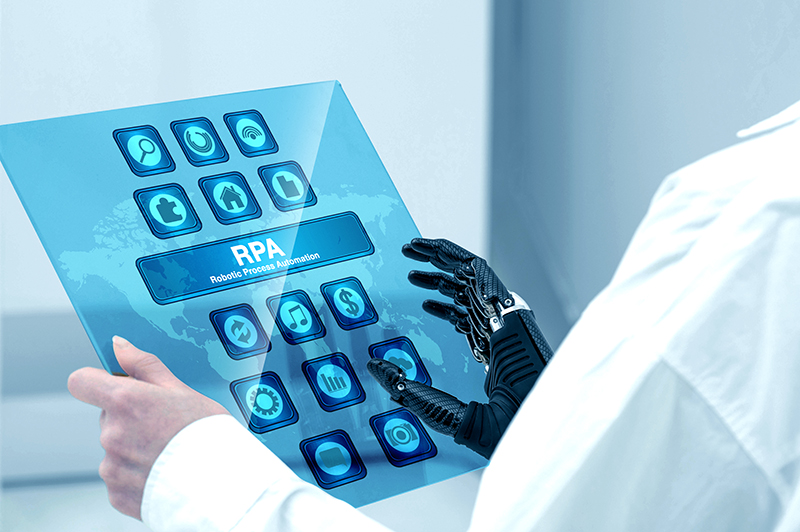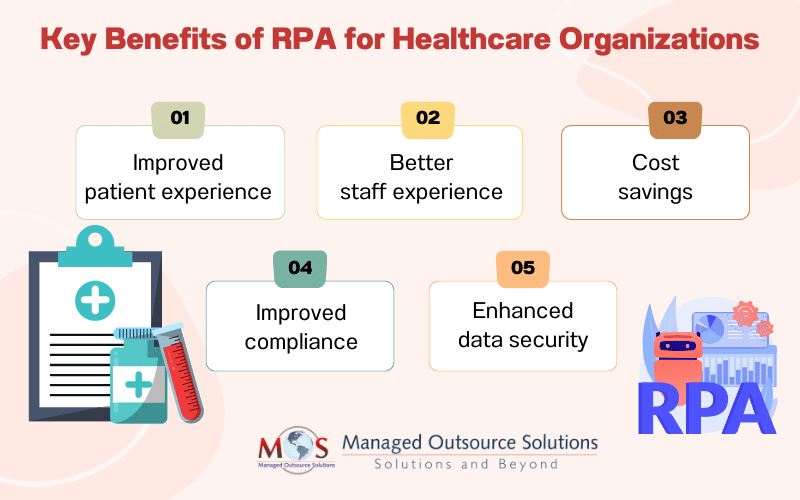Precision, turnaround, staff and patient experience are critical in healthcare. Due to the real-time nature of healthcare, any delays or inefficiencies in processes can directly impact patient outcomes and satisfaction. Manual operations increase costs and turnaround. Automation and digitization can improve accuracy, speed, and staff focus on patients. Robotic Process Automation (RPA) in healthcare automates routine tasks, eliminates human errors, reduces staffing needs, and lowers operational costs. Precedence Research predicts that the global market of RPA in healthcare, which was valued at $1.4 billion in 2022, is projected to reach $14.18 billion by 2032, at a CAGR of 26.1% from 2023 to 2032. Partnering with a robotic process automation company is the best way for healthcare organizations to implement innovative automation technologies and achieve operational excellence in healthcare.
Leverage the Power of Automation with our advanced business process outsourcing solutions!
Scope of RPA in Healthcare
Robotic process automation (RPA) can virtually automate any repetitive and manual task, critical to the functioning and processing of healthcare. The technology leverages software robots or just bots, to execute high-volume repetitive tasks in a digital environment. It automates repetitive, manual processes like data entry, patient scheduling and claims processing. Robotics and AI can streamline healthcare workflows, driving process excellence, reducing manual work, and enhancing patient care.
The healthcare industry functions in real-time with no windows for delay and mistakes. Healthcare professionals perform several cumbersome and tedious administrative activities manually. Apart from ensuring accuracy, they need to comply with evolving healthcare laws and regulations, which can be quite challenging. Reports estimate that the industry collectively spends an astounding $2.1 billion each year on poorly performed and error-prone manual tasks around provider data management alone. Similarly, insurance companies spend somewhere between $6 million to $24 million annually to rectify poor provider data quality.
RPA has brought about a radical change in the healthcare industry. By implementing RPA, providers can deliver high-quality, personalized care while cutting overall costs, ensure compliance with the laws and regulations, eliminate errors in data-intensive processes, and increase operational efficiency.
How RPA Makes the Difference
- Patient Experience – RPA streamlines administrative tasks, resulting in many benefits for patients, including shorter wait times and faster service delivery. The use of AI-powered platforms enhances care efficiency. For instance, chatbots can automate the vaccination appointment scheduling and reminder process, reducing the administrative burden on healthcare staff. The CDC’s CDC Vaccine Schedules app is optimized for tablets and useful on smartphones. The app shows child, adolescent, and adult vaccines recommended by the Advisory Committee on Immunization Practices.
- Medical Transcription – AI-powered transcription services can transcribe audio recordings significantly faster than human transcriptionists, revolutionizing how healthcare professionals document and manage patient records. These AI-powered clinical documentation systems leverage advanced speech recognition technology to automatically capture and transcribe a clinician’s dictation in real-time. This enables healthcare providers to create comprehensive patient notes more efficiently, improving productivity and freeing up clinicians to focus more on patient care.
- Clinical Decision Support – RPA is being utilized to analyze various medical reports and evaluate past medical history, and arrive at a definite diagnosis of a condition. With the integration of AI and Intelligent Automation, these tasks are performed automatically without missing any data point. This enables healthcare providers to deliver a more personalized treatment.
- Staff Allocation Efficiency – The healthcare industry faces challenges in terms of shortage of specialized staff. the ability to forecast staffing needs by analyzing historical data. By examining past trends and patterns, AI enables healthcare organizations to anticipate changes in patient demand and optimize staffing levels accordingly. This helps ensure proper resource allocation and timely delivery of care.Machine learning (ML) techniques play a crucial role in this staff allocation optimization process. Clustering algorithms, for instance, can identify common groupings within patient populations or healthcare services. Regression analysis is also frequently used to predict staffing needs based on continuous variables. This enables healthcare administrators to make more informed, data-driven decisions when allocating staff resources.
- Inventory Management – In order to provide a top-notch patient experience, it is essential to ensure that the medicine inventory is effectively monitored and stock levels are maintained correctly in the healthcare facility. Automation in healthcare can be employed to track inventory. The technology can further be integrated with vendors to automate the maintenance and requirement process.
Key Benefits of RPA in Healthcare
According to a Markets and Markets research report, the global AI in healthcare market size was valued at USD 20.9 billion in 2024 and is estimated to reach USD 148.4 billion in 2029, registering a CARG of 48.1% during the forecast period.
Here are the key benefits that RPA offers healthcare organizations –
- Improved patient experience – RPA handles administrative tasks quickly, allowing healthcare providers to deliver information to patients instantly and accurately. By automating scheduling and reminders, RPA improves the customer experience and reducing missed appointments.
- Better staff experience – Automating repetitive workflows with RPA frees staff to focus on patient care, not paperwork, boosting job satisfaction and opportunities for strategic, knowledge-based work.
- Cost savings – RPA performs tasks more efficiently, reducing errors and human resource costs. Studies show the healthcare industry can save billions by automating revenue cycle processes.
- Improved compliance – RPA ensures processes adhere to rules, automating compliance checks like verifying lab tests performed within 24 hours of a clinic visit.
- Enhanced data security – RPA limits access to patient records, processing data securely without manual intervention. It also enables safe electronic storage, extraction, and migration of health data.
As healthcare data continues to expand in volume and complexity, the role of AI in the medical sector will only grow. Coupled with the pressing need to curb rising healthcare costs, improvements in computing power and declining hardware prices will further drive AI adoption. Additionally, the widening gap between healthcare workers and patients will increase demand for AI-powered solutions to enhance service delivery. Business process outsourcing companies now play a pivotal role in helping organizations across industries leverage the power of automation. These BPO providers stay at the forefront of RPA technology, continuously exploring new ways to optimize business processes.





